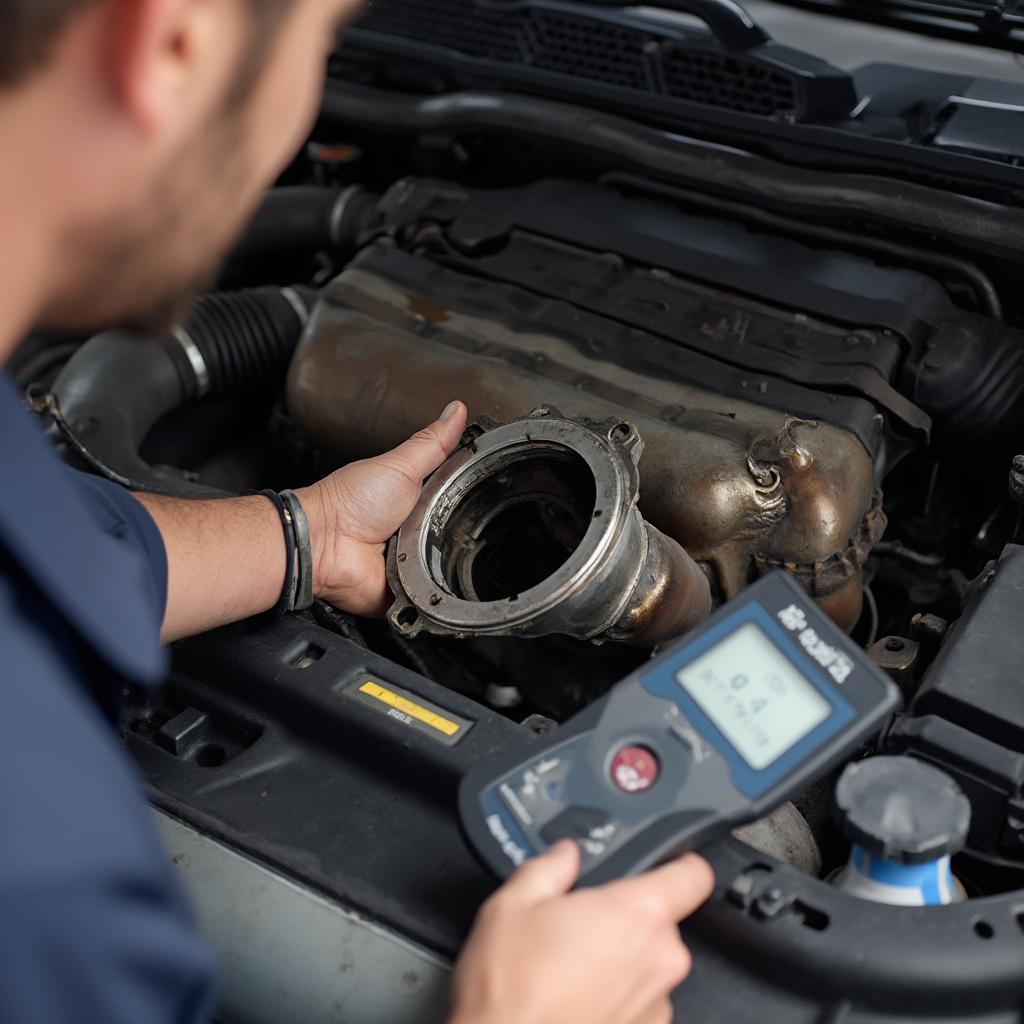The dreaded OBD2 P0420 code is a common sight for Ford owners. This code indicates a potential problem with your vehicle’s catalytic converter system, specifically pointing to insufficient catalytic converter efficiency. Knowing what this code means, its potential causes, and how to fix it can save you time and money. Let’s dive in and explore everything you need to know about the obd2 p0420 ford code.
For many Ford owners, seeing the ford obd2 codes po420 can be alarming. But don’t panic! We’re here to help you understand this common issue.
What Does the P0420 Code Mean for Ford Vehicles?
The P0420 code is a generic OBD2 code, meaning it applies to most vehicles, including Fords. It specifically signifies “Catalyst System Efficiency Below Threshold (Bank 1).” “Bank 1” refers to the side of the engine that contains cylinder number one. This code triggers when the oxygen sensors downstream of the catalytic converter report similar readings to the upstream sensors. This suggests the converter isn’t effectively converting exhaust gases, a crucial function for emissions control.
Common Causes of the P0420 Code in Fords
Several factors can trigger a P0420 code in your Ford. Some common culprits include:
- Faulty Catalytic Converter: This is the most obvious cause. Over time, the internal honeycomb structure of the converter can degrade, reducing its efficiency.
- Exhaust Leaks: Leaks in the exhaust system before the catalytic converter can introduce excess oxygen, disrupting sensor readings and triggering the code.
- Faulty Oxygen Sensors: While the code points towards the converter, a malfunctioning oxygen sensor (especially the downstream sensor) can provide inaccurate readings, falsely triggering the P0420 code.
- Engine Misfires: Unburnt fuel entering the exhaust can damage the catalytic converter, leading to a P0420.
- Rich Fuel Mixture: A rich fuel mixture, often caused by a faulty fuel injector or sensor, can overload the catalytic converter and decrease its efficiency.
How to Diagnose and Fix the P0420 Code in Your Ford
Diagnosing a P0420 requires a systematic approach. Here’s a step-by-step guide:
- Verify the Code: Use an OBD2 scanner to confirm the P0420 code. Clear the code and see if it returns. A recurring P0420 indicates a real problem.
- Inspect for Exhaust Leaks: Check the entire exhaust system for leaks, especially around the manifolds, gaskets, and piping. Repair any leaks before proceeding.
- Check the Oxygen Sensors: Inspect the wiring and connectors of the oxygen sensors for damage. Test the sensors using a multimeter or an advanced scan tool to verify they are functioning correctly. If you’re dealing with a different OBD2 system, the 2000 buick lesabre obd2 information might be helpful.
- Test the Catalytic Converter: Use a vacuum gauge to test the back pressure of the exhaust. Excessive back pressure can indicate a clogged converter.
- Check for Engine Misfires: Address any engine misfire codes before tackling the P0420. Misfires can damage the converter over time.
What if it’s Not the Catalytic Converter?
Sometimes, the P0420 code can be misleading. Here are a few less common causes:
- Fuel System Issues: Problems with the fuel injectors, fuel pressure regulator, or other fuel system components can lead to a rich fuel mixture, triggering the code.
- Engine Performance Issues: Issues like low compression or vacuum leaks can affect combustion efficiency and trigger a P0420.
- Aftermarket Exhaust Systems: Some aftermarket exhaust systems, especially those without proper catalytic converters, can cause the P0420. Consider this if you’ve recently modified your exhaust.
You can find helpful resources on platforms like obd2 youtube to further aid your diagnosis.
Conclusion
The OBD2 P0420 code in your Ford signals a potential problem with your vehicle’s catalytic converter system. While a faulty converter is the most common cause, other factors like exhaust leaks, faulty oxygen sensors, and engine misfires can also trigger this code. By systematically diagnosing the issue using the steps outlined above, you can pinpoint the root cause and fix the P0420, ensuring your Ford runs smoothly and efficiently.
FAQ
- Can I drive my Ford with a P0420 code? While you can usually still drive, ignoring the P0420 code can lead to further damage and potentially fail an emissions test.
- How much does it cost to fix a P0420 code? The cost varies depending on the cause. Oxygen sensor replacement is less expensive than a catalytic converter replacement.
- How can I prevent a P0420 code in the future? Regular maintenance, including addressing engine misfires promptly, and using quality fuel can help prevent future P0420 codes.
- Can a faulty gas cap cause a P0420 code? While a faulty gas cap can trigger other codes related to the evaporative emissions system, it’s unlikely to directly cause a P0420.
- Is it safe to reset the P0420 code myself? Yes, you can reset the code with an OBD2 scanner. However, if the underlying issue persists, the code will return.
- Can I use an OBD2 scanner for my Subaru? Absolutely, resources like topdon obd2 subaru can help you choose the right scanner.
- Does Toyota have its own OBD2 system? Yes, you can find information about toyota tis obd2 online.
Need further assistance with your OBD2 P0420 Ford issue? Contact us via WhatsApp: +1(641)206-8880, or Email: cardiagtechworkshop@gmail.com. Our 24/7 customer support team is here to help.


